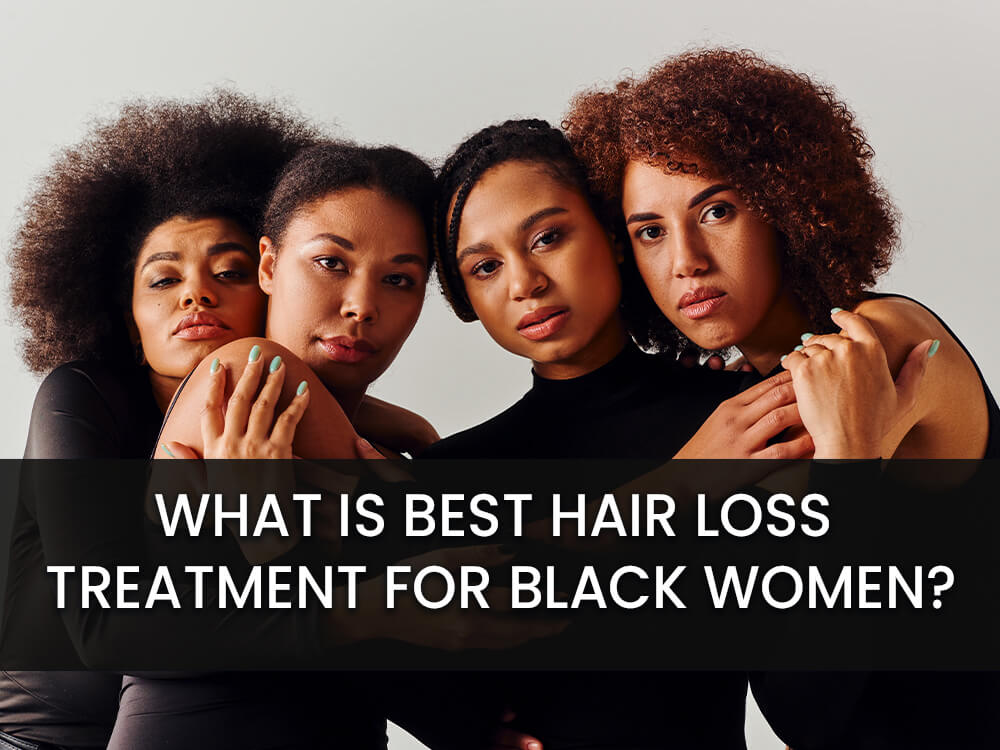
Hair loss is a common concern that affects people of all backgrounds, but it can be particularly distressing for black women. Understanding the causes and finding the most effective treatments for hair loss in black women is crucial in order to restore confidence and promote healthy hair growth. In this article, we will explore the various factors that contribute to hair loss in black women and discuss the best treatments and remedies available.
Understanding Hair Loss in Black Women
The Role of Genetics in Hair Loss
Genetics play a significant role in hair loss among black women. Many are genetically predisposed to conditions like androgenetic alopecia, commonly known as female pattern baldness. This condition causes hair to gradually thin and fall out in specific patterns. Understanding your genetic history and family background can provide valuable insights into the potential causes of your hair loss.
It is important to note that genetic predisposition is not the sole factor contributing to hair loss in black women. Environmental factors, lifestyle choices, and overall health also play crucial roles in the maintenance of healthy hair. Factors such as diet, stress levels, and hormonal imbalances can all impact the health of your hair follicles and contribute to hair loss.
Impact of Hairstyling Practices on Hair Health
Hairstyling practices can also contribute to hair loss in black women. Frequent and prolonged use of tight hairstyles, such as braids, weaves, and extensions, can put excessive tension on the hair follicles and lead to a condition called traction alopecia. Using heat styling tools or chemical treatments without proper care can further damage and weaken the hair shafts, resulting in breakage and hair loss.
Furthermore, the use of harsh chemicals in hair products, such as relaxers and dyes, can strip the hair of its natural oils and nutrients, leaving it dry, brittle, and prone to breakage. It is essential to choose hair care products that are specifically formulated for your hair type and to follow a consistent hair care routine to maintain the health and strength of your hair.
Common Causes of Hair Loss in Black Women
Hormonal Imbalances and Hair Loss
Hormone imbalances, such as those related to pregnancy, menopause, or certain medical conditions, can contribute to hair loss in black women. Fluctuations in hormone levels can disrupt the hair growth cycle and result in excessive shedding. It is important to consult with a healthcare professional to address any hormonal imbalances that may be affecting your hair health.
Moreover, hormonal changes can also lead to conditions like androgenetic alopecia, commonly known as female pattern baldness. This condition is characterized by a gradual thinning of the hair, particularly at the crown and temples. Understanding the role of hormones in hair loss is crucial for developing effective treatment strategies tailored to individual needs.
Nutritional Deficiencies Leading to Hair Loss
A lack of essential nutrients can also contribute to hair loss in black women. A diet lacking in vital vitamins, minerals, and proteins can weaken the hair follicles and inhibit healthy hair growth. Ensuring a well-balanced diet that includes foods rich in biotin, iron, vitamin D, and omega-3 fatty acids can help promote hair health and reduce the risk of hair loss.
In addition to the mentioned nutrients, zinc deficiency has been linked to hair loss in women of color. Zinc plays a crucial role in hair tissue growth and repair, making it essential for maintaining healthy hair. Incorporating zinc-rich foods like oysters, nuts, and seeds into your diet can help prevent hair loss associated with nutritional deficiencies.
Evaluating Hair Loss Treatments
Over-the-Counter Treatments and Their Effectiveness
Over-the-counter hair loss treatments, such as Minoxidil, can be effective options for stimulating hair growth in black women. These topical solutions work by increasing blood flow to the hair follicles and promoting hair regrowth. However, it is important to use these products as directed and be patient, as results may take several months to become noticeable.
It’s worth noting that while over-the-counter treatments can be beneficial for many individuals, they may not work for everyone. Factors such as the underlying cause of hair loss, individual genetics, and overall health can play a role in the effectiveness of these treatments. Therefore, it’s essential to consult with a healthcare provider or dermatologist to determine the most suitable approach for addressing your specific hair loss concerns.
Prescription Treatments and What to Expect
In more severe cases of hair loss, prescription treatments, such as finasteride, may be recommended by a dermatologist. These medications work by reducing the production of hormones that contribute to hair loss. It is important to consult with a healthcare professional to determine if prescription treatments are suitable for you and to understand any potential side effects.
When considering prescription treatments for hair loss, it’s crucial to have realistic expectations. While these medications can be effective in slowing down or even reversing hair loss in some individuals, results may vary. It’s also important to be aware of potential side effects associated with prescription treatments, which can range from mild to more severe. Your healthcare provider will be able to provide you with detailed information about the benefits and risks of these medications, helping you make an informed decision about your hair loss treatment plan.
Natural Remedies for Hair Loss
Essential Oils and Their Benefits for Hair Health
Many essential oils have shown promising results in promoting hair growth and reducing hair loss. Oils such as rosemary, peppermint, and lavender have been found to stimulate blood circulation to the scalp and nourish the hair follicles. Incorporating these oils into your hair care routine through scalp massages or by adding them to your shampoo can potentially improve the health and growth of your hair.
Moreover, essential oils not only benefit hair health but also provide a soothing and aromatic experience during your hair care routine. The invigorating scent of peppermint can awaken your senses, while the calming aroma of lavender can help you relax and unwind after a long day. This sensory aspect adds an extra layer of enjoyment to your self-care regimen.
Dietary Changes to Promote Hair Growth
Aside from topical treatments, making dietary changes can also help promote healthy hair growth. Including foods rich in vitamins A, C, E, and B-complex, as well as proteins and antioxidants, can provide the necessary nutrients for strong and vibrant hair. Additionally, staying hydrated and reducing stress levels can positively impact hair health.
Furthermore, a balanced diet not only supports hair growth but also contributes to overall well-being. Foods rich in essential nutrients not only nourish your hair follicles but also benefit your skin, nails, and overall health. By focusing on a nutrient-dense diet, you are not only investing in your hair but also in your overall vitality and longevity.
The Importance of a Hair Care Routine
Having a consistent hair care routine is crucial for maintaining the health and vitality of your hair, especially if you have black hair. A well-executed hair care routine can make a noticeable difference in the overall appearance and strength of your hair. Not only does it help to keep your hair looking fabulous, but it also plays a significant role in preventing hair loss and damage.
Choosing the Right Hair Care Products
Investing in high-quality hair care products specifically designed for black hair is a game-changer. The market is flooded with various products, but not all of them are created equal. To ensure optimal results, it’s important to look for products that are free of harsh chemicals, sulfates, and alcohols that can strip the hair of its natural moisture and lead to breakage. Opt for deep conditioning treatments, leave-in conditioners, and protective serums that are formulated to retain moisture, strengthen the hair, and reduce the risk of hair loss.
Protective Hairstyles to Prevent Hair Loss
When it comes to preventing hair loss and damage, incorporating protective hairstyles into your hair care routine can work wonders. Protective styles such as braids, twists, buns, and wigs can give your hair a much-needed break from constant manipulation and reduce tension on the hair follicles. By minimizing the strain on your hair, you can significantly reduce the risk of hair loss. However, it’s important to note that protective styles should not be done too tightly, as this can lead to a condition called traction alopecia, which is characterized by hair loss caused by excessive pulling or tension.
In addition to choosing the right hair care products and incorporating protective hairstyles, there are other factors to consider when it comes to maintaining healthy hair. Factors such as diet, hydration, and overall lifestyle play a crucial role in the health of your hair. A balanced diet rich in vitamins and minerals, along with proper hydration, can contribute to the overall strength and growth of your hair. Additionally, avoiding excessive heat styling, minimizing chemical treatments, and protecting your hair from environmental factors such as harsh sunlight and pollution can also help maintain the health of your hair.
A comprehensive approach to hair care is essential for black women who want to effectively manage hair loss and promote healthy hair growth. By understanding the unique needs of black hair, investing in quality hair care products, incorporating protective hairstyles, and adopting a healthy lifestyle, you can achieve and maintain the beautiful, strong, and vibrant hair you desire. Remember, consulting with a healthcare professional or dermatologist can provide personalized guidance and recommendations tailored to your specific needs.



